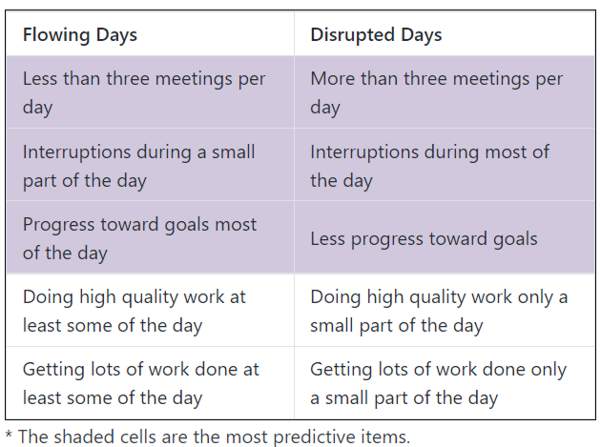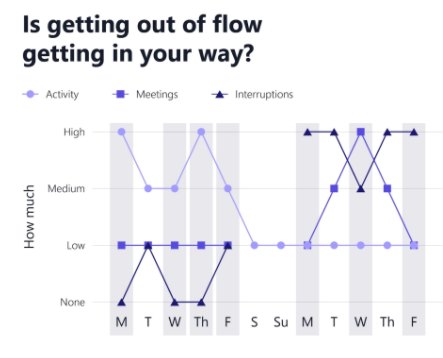| What Ruins A Developer's Day |
| Written by Janet Swift | |||
| Wednesday, 16 June 2021 | |||
|
The quick answer to this is interruptions and meetings. GitHub has taken a detailed look at what helps developers have good days in the Good Day Project and discovers that simply taking a few minutes to reflect at the end of the working day made a big difference to how they felt. Introducing the results of the Good Day Project, Eirini Kallimvako writes: Developers want to make their work days better — and to make them better consistently and reliably. It feels great to get into a flow and have an awesome day or an awesome week, but can be frustrating to fall out of that flow and find ourselves looking back on our days wondering: what was it that made things “click” into place? Acknowledging that its hard to work out what makes one work day good and another one awful prompted an internal GitHub investigation involving 40 participants. All the participants, whose jobs spanned a range of levels at varying geographic locations worked remotely. To take part in the study they were prompted once or twice a day over a 2-week period to take a couple of minutes to complete a quick survey that asked them first characterize their day as Awesome, Good, OK, Bad, or Terrible and then supply some information using the SPACE productivity framework. SPACE is an acronym for satisfaction, performance, activity, communication, and efficiency and the framework is a new approach to defining, measuring and predicting developer productivity by researchers at GitHub, the University of Victoria, and Microsoft Research led by GitHub vice-president of research & strategy Nicole Forsgren and written up in an article,The SPACE of Developer Productivity published in the March/April 2021 issue of acmqueue. According to the researchers, each of the five SPACE dimensions is key to understanding and measuring productivity and they have devised metrics for each of them at individual, team and system level. For the purposes of the Good Day Project the individual metrics were used - for example Activity encompasses number of number of commits, code reviews completed, coding time and lines of code. Using the SPACE productivity framework and asking questions about stress, breaks, meetings, interruptions, if they worked with or helped others, and how much work they got done, the researchers classified the type of day experienced by developers as "Flowing" or "Disrupted": They concluded that: What distinguished Flowing days from Disrupted days was an average of less than three meetings a day and interruptions being contained to a small part of the day. Flowing days were also more likely to be rated as good days, so managing to safeguard our focus can help us have better days. Being able to make progress toward goals much of the day also impacted how developers felt about their days. In return for completing the survey the participants they were given personalized reports including charts to help them spot patterns. Out of seven charts included in the report, developers found the one below most interesting. It shows a developer’s level of meetings, interruptions, and activity on github.com each day: The days developers reported as Good Days were highlighted in light grey. This layout helped developers see how meetings and interruptions (measures of efficiency and flow from the SPACE framework) affect both their activity metrics and how well they felt overall that day: Overall the key findings of the study were:
Another interesting finding was that the simple act of taking a few minutes at the end of each work day to reflect made a big difference in how they felt. It turned out that being asked to complete surveys noting key activities and how they felt about the day helped developers gain insight and many of the developers wanted to extend the survey beyond 2 weeks. According to Eirini Kallimvako: One of the core benefits developers got out of the Good Day project was developing the habit of self-reflection.
More InformationThe Good Day Project—Personal analytics to make your work days better The SPACE of Developer Productivity by Nicole Forsgren, GitHub; Margaret-Anne Storey, University of Victoria; Chandra Maddila, Thomas Zimmermann, Brian Houck, and Jenna Butler, Microsoft Research
Related ArticlesWorking At Home: Does It Impact Developer Productivity? What Eats Your Programming Time Happy Programmers Produce Better Apps On the Unhappiness of Software Developers Five Ways to Improve Your Personal Productivity as a Developer To be informed about new articles on I Programmer, sign up for our weekly newsletter, subscribe to the RSS feed and follow us on Twitter, Facebook or Linkedin.
Comments
or email your comment to: comments@i-programmer.info
|
|||
| Last Updated ( Tuesday, 22 June 2021 ) |




